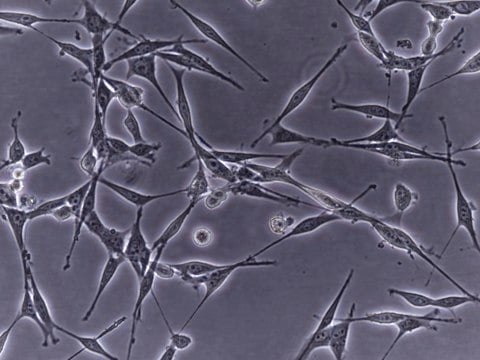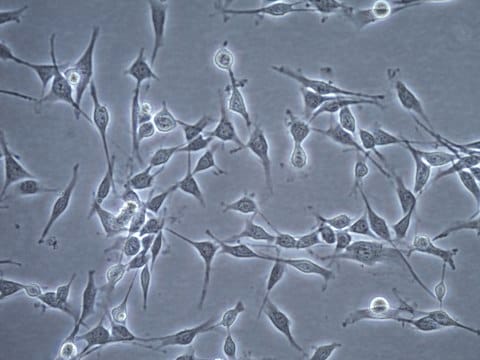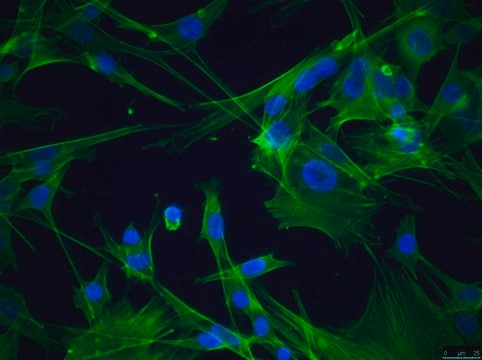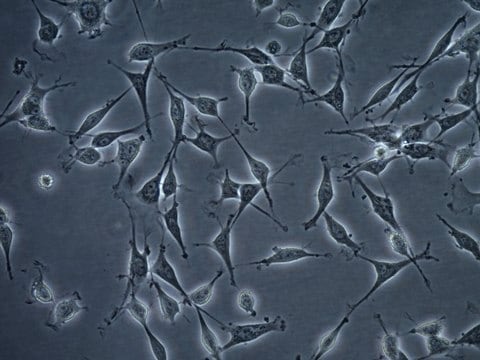SCC448
OSUMMER.4 Mouse NRAS-Mutant Melanoma Cell Line
Mouse
Synonyme(s) :
Mouse melanoma cell line
About This Item
Produits recommandés
product name
OSUMMER.4 Mouse NRAS-Mutant Melanoma Cell Line,
Source biologique
mouse
Niveau de qualité
Conditionnement
vial of ≥1X10⁶ cells/vial vial
Fabricant/nom de marque
Millipore
Mode de croissance
N/A
Technique(s)
cell culture | mammalian: suitable
Conditions d'expédition
liquid nitrogen
Température de stockage
−196°C
Application
Cells are tested negative for infectious diseases by a Mouse Essential CLEAR Panel and have been found to be negative for all pathologies in this test.
Cells are verified to be of mouse origin and negative for interspecies contamination from rat, human, Chinese hamster, Golden Syrian hamster, and non-human primate (NHP) as assessed by a Contamination Clear panel.
Cells are negative for mycoplasma contamination.
Cells are genotyped by STR analysis to verify the unique identity of the cell line.
OSUMMER.6 NRAS mouse melanoma cell line was derived from a male TN mouse (homozygous for the LSL-NrasQ61R allele) exposed to UVA and UVB radiation. OSUMMER.4 can form tumors in vivo without Matrigel injection. WES (whole exome sequencing) revealed high SNV (Single Nucleotide variants) and low CNA (copy number alterations) burden, as well as the presence of UV signature mutations. OSUMMER.4 cells express the melanoma markers PMEL and MelanA and exhibit robust growth in culture. OSUMMER.6 cells demonstrate a relatively low (<lt/>200) mutation burden compared with other OSUMMER NRAS Q61R mutants, and are resistant to MEK inhibition (MEKi).
Source
OSUMMER.6 was derived from melanoma induced in TN (Tyr::CreER) mice exposed to UVA or UVB radiation on postnatal day 3 (1).
References
1. Bowman, R. L., et al. (2021). UVB mutagenesis differs in Nras-and Braf-mutant mouse models of melanoma. Life Science Alliance, 4(9).
Caractéristiques et avantages
Stockage et stabilité
Autres remarques
Clause de non-responsabilité
Produit(s) apparenté(s)
Code de la classe de stockage
10 - Combustible liquids
Classe de danger pour l'eau (WGK)
WGK 2
Point d'éclair (°F)
Not applicable
Point d'éclair (°C)
Not applicable
Certificats d'analyse (COA)
Recherchez un Certificats d'analyse (COA) en saisissant le numéro de lot du produit. Les numéros de lot figurent sur l'étiquette du produit après les mots "Lot" ou "Batch".
Déjà en possession de ce produit ?
Retrouvez la documentation relative aux produits que vous avez récemment achetés dans la Bibliothèque de documents.
Notre équipe de scientifiques dispose d'une expérience dans tous les secteurs de la recherche, notamment en sciences de la vie, science des matériaux, synthèse chimique, chromatographie, analyse et dans de nombreux autres domaines..
Contacter notre Service technique







